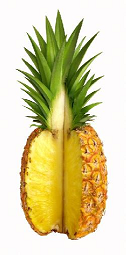- Bromelain is not actually a single substance, but rather a collection of protein-digesting enzymes (also called proteolytic enzymes ) found in pineapple juice and in the stem of pineapple plants.
- Pineapple has been used for centuries in Central and South America to treat indigestion and reduce inflammation. Bromelain, which is derived from the stem and juice of the pineapple, was first isolated from the pineapple plant in the late 1800s. The German Commission E approved bromelain to treat swelling and inflammation after surgery, particularly sinus surgery.
Contents
Uses
- Bromelain can be used to treat a number of conditions, but it is particularly effective in reducing inflammation from infection and injuries.
- Bromelain is used for reducing swelling (inflammation), especially of the nose and sinuses, after surgery or injury. It is also used for hay fever, treating a bowel condition that includes swelling and ulcers (ulcerative colitis), removing dead and damaged tissue after a burn (debridement), preventing the collection of water in the lung (pulmonary edema), relaxing muscles, stimulating muscle contractions, slowing clotting, improving the absorption of antibiotics, preventing cancer, shortening labor, and helping the body get rid of fat. It is also used for preventing muscle soreness after intense exercise.
- Surgery, Sprains and Strains, and Tendinitis: Although studies show mixed results, bromelain may reduce swelling, bruising, healing time, and pain after surgery and physical injuries. It is often used to reduce inflammation from with tendinitis, sprains and strains, and other minor muscle injuries. Studies of people having dental, nasal, and foot surgeries found it did reduce inflammation. In Europe, bromelain is used to treat sinus and nasal swelling following ear, nose, and throat surgery or trauma.
- Wounds and Burns: Some studies of animals suggest that bromelain, when applied to the skin, may be useful in removing dead tissue, a process called debridement, from third-degree burns. One preliminary study using a debridement agent that is derived from bromelain to treat people with second- and third-degree burns showed a benefit. Severe burns require a doctor’s care. Do not apply bromelain to broken skin.
- Sinusitis (Sinus inflammation): Although not all studies agree, bromelain may help reduce cough and nasal mucus associated with sinusitis, and relieve the swelling and inflammation caused by hay fever.
- Arthritis: Studies show mixed results, but one study suggested that a combination of bromelain, rutosid, and trypsin worked as well as nonsteroidal anti-inflammatory drugs, which are commonly used pain relievers, for reducing knee pain from osteoarthritis. NSAIDs include ibuprofen (Advil or Motrin), naproxen (Aleve), and diclofenac (Voltaren), among others. Some early studies suggest that bromelain may also help reduce pain in people with rheumatoid arthritis, but the results are not certain.
- Infection: Some evidence from test tube and animal studies suggests that bromelain can kill some viruses and bacteria. But more research, including human studies, is needed to see whether it truly works.
Benefits
- Bromelain seems to cause the body to produce substances that fight pain and swelling (inflammation).
Caution
- Bromelain appears to be essentially nontoxic, and it seldom causes side effects other than occasional mild gastrointestinal distress or allergic reactions.
- In addition, one trial suggests that doses of bromelain eight times higher than standard recommendations might increase heart rate (but not blood pressure).
- Safety in young children, pregnant or nursing women, or those with liver or kidney disease has not been established.
Interactions
- Because bromelain “thins” the blood to some extent, it shouldn’t be combined with drugs such as warfarin (Coumadin) without a doctor’s supervision.
- According to one small animal study, bromelain might interact with sedative medications, increasing their effect. As noted above, it might also increase blood levels of various antibiotics , which could present risks in some cases.
- If you are taking medications that thin the blood, such as warfarin (Coumadin) or heparin , sedative drugs such as benzodiazepines , or antibiotics : Bromelain might amplify their effect.
Other Names
Ananas, Ananus ananus, Ananas comosus, Ananus duckei, Ananas sativus, Bromelaine, Bromélaïne, Bromelains, Bromelainum, Bromelia ananus, Bromelia comosa, Bromelin, Bromelina, Broméline, Concentré de Protéase Végétale, Enzyme d’Ananas, Extrait d’Ananas, pHysioprotease, Pineapple, Pineapple Enzyme, Pineapple Extract, Plant Protease Concentrate.

